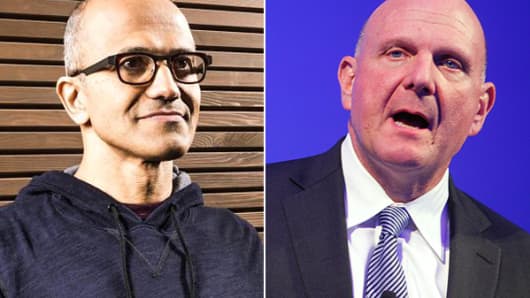Microsoft makes a small acquisition to help it catch Amazon's cloud
- Get link
- X
- Other Apps

When Steve Ballmer was CEO of Microsoft, he once famously jumped around on stage at a conference sporting a sweat-drenched shirt and shouting one word repeatedly: developers!
Ballmer's 14-year reign at the helm of the software company ended three years ago, in part because developers were going anywhere but Microsoft.
Whether it was Apple and Android for creating mobile apps, AmazonWeb Services for testing and running websites, or free open source technologies that were easy to deploy and customize, many programmers shunned Microsoft's old developer platforms in favor of shinier toys elsewhere.
Since replacing Ballmer as CEO in early 2014, Satya Nadella has made it one of his primary goals to bring back developers. His latest move came Monday with Microsoft's acquisition of Deis, an open source tool that makes it easier for developers to build, run and move applications between on-premises machines and clouds from various providers. Terms of the deal weren't disclosed
Microsoft's Azure cloud is a distant second to Amazon Web Services (AWS), and Nadella is racing to grab a bigger share of the market as companies rapidly move workloads out of their own data centers and into the cloud. Promoting emerging open source projects is critical to win business from developers who want the largest possible choice of software and platforms.
"With all of the open source projects that are all the rage with developers, you have to have the offerings to cater to that if you want to attract them to your cloud," said John Vrionis, a partner at Silicon Valley venture capital firm Lightspeed Venture Partners and an investor in enterprise software. "If developers start in AWS and get comfortable, they're not going to even think about Azure."
Microsoft recently started working with Databricks to bring the start-up's data integration and analytics tools to Azure. Databricks, one of a few companies commercializing the open source Apache Spark framework, has to date only run in AWS. And late last year, Microsoft made the shocking decision to join the Linux Foundation as a platinum member, publicly supporting the open source platform that has long competed with Microsoft's flagship Windows operating system.
This new emphasis on openness is not limited to Azure. A year ago, Microsoft spent $500 million on a company called Xamarin, whose software helps developers create apps across all major mobile platforms, which primarily means iOS and Android.
Cloud is the big battle. That's where Microsoft's Windows servers, which have a big role in many companies' data centers, are being tossed aside as businesses offload their infrastructure. At the end of 2016, AWS controlled 40 percent of the cloud infrastructure market, while the next three players -- Microsoft, Google and IBM -- accounted for a combined 23 percent, according to Synergy Research Group.
The acquisition of Deis pushes Microsoft deeper into the red hot container market. Containers let developers build code in a virtual box so it can be easily shared or moved between apps and across clouds. Scott Guthrie, the executive vice president for Microsoft's cloud and enterprise group, called containers "the new currency in the cloud."
"At Microsoft, we've seen explosive growth in both interest and deployment of containerized workloads on Azure, and we're committed to ensuring Azure is the best place to run them," Guthrie wrote in a blog post on Monday.
Deis promotes itself as "making Kubernetes easy to use." Kubernetes is an open source container technology developed at Google for deploying and scaling apps. Microsoft purchased Deis from Engine Yard, a company whose software is designed to make apps run smoothly in the cloud.
- Get link
- X
- Other Apps
Comments
Post a Comment